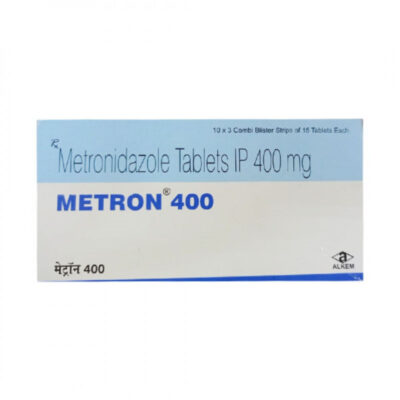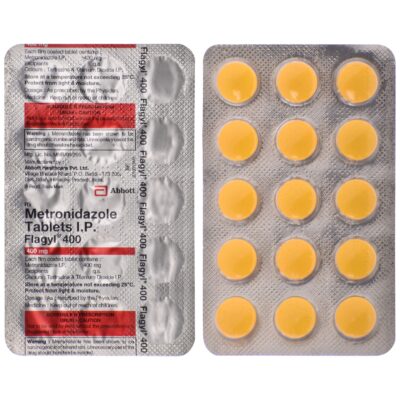💊🦠 Metronidazole 400 mg Tablet
“Target Infections at the Root”
Antibacterial | Antiprotozoal | Anaerobic Defense
📋 What is Metronidazole 400 mg?
Metronidazole 400 mg is a nitroimidazole-class antibiotic and antiprotozoal agent. It is highly effective against anaerobic bacteria and protozoa, making it a first-line treatment for a range of gastrointestinal, urogenital, dental, and systemic infections.
The tablet form is used systemically to treat infections caused by organisms that thrive in low-oxygen environments or in combination therapies for mixed infections.
🔬 Active Ingredient
-
Metronidazole 400 mg
-
Class: Nitroimidazole antimicrobial
-
Mechanism: Enters microbial cells and interferes with DNA synthesis, leading to cell death
-
Effective against:
-
Anaerobic bacteria (e.g., Bacteroides, Clostridium)
-
Protozoa (e.g., Giardia lamblia, Trichomonas vaginalis, Entamoeba histolytica)
-
-
💡 Indications / Uses
Metronidazole 400 mg is indicated for:
-
Amoebiasis (intestinal and hepatic)
-
Giardiasis
-
Trichomoniasis (genital infections)
-
Bacterial vaginosis
-
Anaerobic infections (e.g., dental, abdominal, pelvic)
-
Clostridium difficile-associated diarrhea
-
Pre- and post-operative prophylaxis for colorectal surgery
-
H. pylori eradication (as part of triple therapy)
🕒 How to Use
-
Dose:
-
Depends on infection type
-
Usually 400–800 mg 2–3 times daily for 5–10 days
-
-
Route: Oral; take with or after food to reduce gastric upset
-
Duration: Must be completed fully even if symptoms improve early
-
Avoid alcohol during therapy and for 48 hours after the last dose (disulfiram-like reaction)
✅ Common Side Effects
-
Metallic or bitter taste
-
Nausea, vomiting, or stomach cramps
-
Diarrhea or constipation
-
Headache or dizziness
-
Dark-colored urine (harmless and reversible)
🚨 Serious Side Effects (Rare)
-
Peripheral neuropathy: tingling, numbness, or burning in hands/feet (especially with long-term use)
-
Seizures or encephalopathy (very rare)
-
Severe allergic reaction: rash, itching, swelling, breathing difficulty
-
Liver toxicity: elevated liver enzymes or jaundice
-
Stevens-Johnson syndrome (extremely rare but serious skin reaction)
Seek medical help if you experience neurologic symptoms, persistent vomiting, or signs of liver damage.
🔍 Monitoring & Follow-Up
-
Liver function tests (LFTs) if used for >10 days or in hepatic impairment
-
Monitor for signs of peripheral neuropathy with prolonged use
-
CBC (complete blood count) in long-term or repeated courses
-
Follow up to ensure complete eradication of infection
-
Renal function monitoring if the patient has kidney issues
⚠️ Warnings & Precautions
-
Contraindicated in first trimester of pregnancy unless clearly needed
-
Avoid alcohol during and for 48 hours after therapy
-
Use cautiously in patients with liver disease, neurological disorders, or seizure history
-
May interact with:
-
Warfarin (increased bleeding risk)
-
Phenytoin, phenobarbital (altered drug levels)
-
Disulfiram (risk of psychosis)
-
📝 Summary
Metronidazole 400 mg Tablet is a powerful oral antimicrobial targeting anaerobic bacteria and protozoal infections. It is widely used for intestinal, vaginal, dental, and systemic infections. While highly effective, adherence to dosage and alcohol avoidance are essential to prevent complications. With proper monitoring and use, Metronidazole remains a cornerstone of infection control, especially in anaerobic environments.
🌟🛡️ “Complete Cure. Deep Defense.”
Trust Metronidazole – Precision Against Anaerobic Infections.
Always follow your doctor’s advice, dosage instructions, and never self-medicate.
Note: This information is intended for educational purposes and should not replace professional medical advice. Always consult your healthcare provider for personalized recommendations.




Reviews
There are no reviews yet.